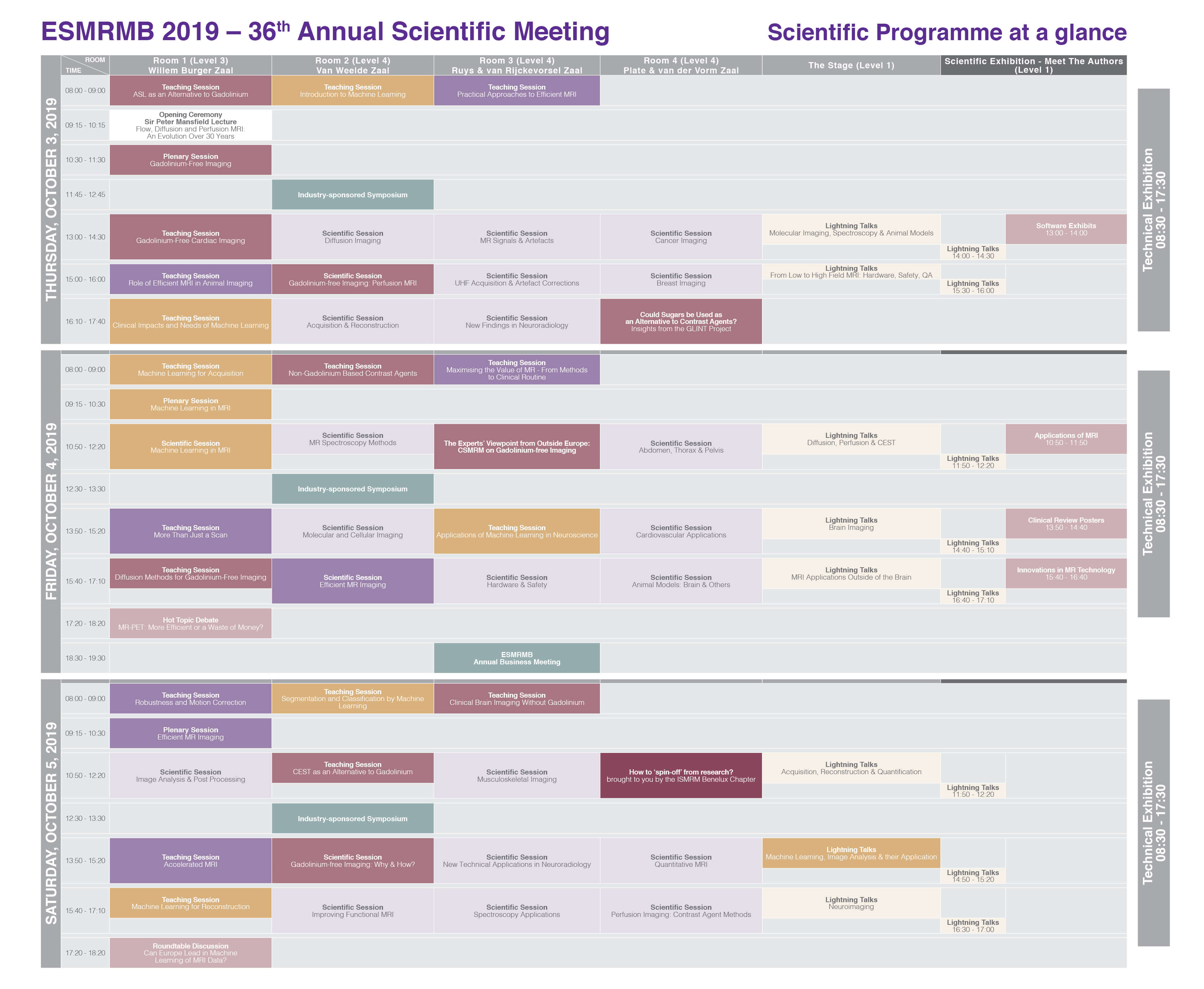Programme
as per August 26, 2019
Programme at a Glance
(for more information on invited speakers, open toggle boxes below)
Full Programme
It is easiest to view the full programme through our new congress app! Search for ‘ESMRMB 2019’ in the App Store or Google Play Store.
You can also download the detailed programme as a pdf file here.
Book of Abstracts
ESMRMB 2019 abstracts have been published as an electronic supplement to MAGMA, the official journal of the society, on springerlink.com.
The complete Book of Abstracts is available on all Springer servers worldwide. The digital object identifier (DOI) ensures that all abstracts of the ESMRMB 2019 meeting are fully citable in literature.
Abstracts, Thursday, October 3, 2019
10.1007/s10334-019-00753-3
Abstracts, Friday, October 4, 2019
10.1007/s10334-019-00754-2
Abstracts, Saturday, October 5, 2019
10.1007/s10334-019-00755-1
ePoster, Paper Poster, Clinical Review Poster, Software Exhibits
10.1007/s10334-019-00756-0
Author Index
10.1007/s10334-019-00757-z
Sir Peter Mansfield Lecture
Freddy Ståhlberg, Lund/SE, will hold the 2019 Sir Peter Mansfield Lecture on the topic of
Flow, Diffusion and Perfusion MRI: An Evolution over 30 Years
Gadolinium-Free Imaging
Plenary Session
Gadolinium-free Imaging
The Good, the Bad and the Ugly of Gadolinium
Alexander Radbruch, Heidelberg/DE
Technical Solutions of Gadolinium-free MRI and their Application
Penny Gowland, Nottingham/UK
Teaching Sessions
ASL as an Alternative to Gadolinium
Perfusion
Ilaria Boscolo-Galazzo, Verona/IT
Angiography
Yuriko Suzuki, Oxford/UK
Gadolinum-free Cardiac Imaging
T1-rho as an Alternative to Late Gadolinium Enhancement
Martijn Froeling, Utrecht/NL
T1 Mapping in Rest and Under Stress
Vanessa Ferreira, Oxford/UK
Cardiac Arterial Spin Labeling
Frank Kober, Marseille/FR
Non-Gadolinium Based Contrast Agents
An Overview of MRI-based Contrast Agents
Dario Longo, Turin/IT
Clinical Applications of SPIOs
Ali Yilmaz, Münster/DE
Diffusion Methods for Gadolinium-free Imaging
Basic Principles and Methods of Microstructural Diffusion as an Alternative to Gadolinium
Angel Alberich-Bayarri, Valencia/ES
Whole Body Diffusion Imaging in the Clinic
M. Erturk, Istanbul/TR
Clinical Brain Imaging without Gadolinium
Structure and Function of the Blood-Brain Barrier in Health and Disease
Elga de Vries, Amsterdam/NL
Blood-Brain Barrier Breakdown Detection Without the Use of Contrast Agents
Linda Knutsson, Lund/SE
CEST as an Alternative to Gadolinium
Basics of CEST – From Invention to Interpretation in Animal Models
Verena Hoerr, Jena/DE
How Can CEST Reduce Gadolinium Use
Moritz Zaiss, Tübingen/DE
Hot Topic Debate
MR-PET: More Efficient or a Waste of Money?
Proponent: Benedikt Schaarschmidt, Essen/DE
Opponent: Francesco Fraioli, London/UK
Moderator: Andrea Rockall, London/UK
Machine Learning in MRI - Acquire, Reconstruct and Apply
Plenary Session
Machine Learning in MRI – Acquire, Reconstruct and Apply
Current Role of Machine Learning in MRI
Julia Schnabel, London/UK
Collaboration of Academia and Industry in Machine Learning
Florian Knoll, New York/US
What is Needed to Get Machine Learning into Clinical Practice
Mathias Prokop, Nijmegen/NL
Teaching Sessions
Introduction to Machine Learning
Concepts and Lexicon of Machine Learning in Medical Imaging
Georg Langs, Vienna/AT
Roadmap: From Clinical Need to Translatable Tool
Thomas Booth, London/UK
Clinical Impacts and Needs of Machine Learning
Detection of Disease
Ender Konukoglu, Zurich/CH
Radiotherapy Planning
Raj Jena, Cambridge/UK
Lesion Characterisation (Radiomics)
Laure Fournier, Paris/FR
Machine Learning for Acquisition
Artefact Reduction with Machine Learning
Thomas Kuestner, London/UK
Deep Learning for Magnetic Resonance Fingerprinting
Andreas Maier, Erlangen/DE
Applications of Machine Learning in Neuroscience
Machine Learning in Diffusion MR
Peter Neher, Heidelberg/DE
Analysing Cortical Organisation and its Relation to Cognition and Behaviour
Emma Robinson, London/UK
Machine Learning for the Detection of Brain Abnormalities
Hugo Kuijf, Utrecht/NL
Segmentation and Classification by Machine Learning
Methodology for Segmentation and Classification
Marleen de Bruijne, Rotterdam/NL
When is Good Good Enough? Evaluation and Testing of Tools for Clinical Application
Declan O’Regan, London/UK
Machine Learning for Reconstruction
Comparison to Existing Methods and Challenges
Martin Uecker, Göttingen/DE
Neural Networks for Undersampled MR Reconstruction
Jo Schlemper, London/UK
Roundtable Discussion
Can Europe Lead in Machine Learning of MRI-Data?
Panellists:
Liesbeth Geerts-Ossevorts, Best/NL
Wiro Niessen, Rotterdam/NL
Filippo Pesapane, London/UK
Nils Broeckx, Leuven/BE
Moderator:
Francesca Pizzini, Verona/IT
Efficient MRI
Plenary Session
Efficient MRI
Hardware for Efficient MRI
David Brunner, Zurich/CH
Sequences for Efficient MRI
Mariya Doneva, Hamburg/DE
Clinical Impact of Compressed Sensing
Siegfried Trattnig, Vienna/AT
Teaching Sessions
Practical Approaches to Efficient MRI
Optimising Patient Management
Joseph Castillo, Valetta/MT
Image Quality Versus Scan Time at 3T: Getting the Balance Right
Máire Hayes, Dublin/IE
Role of Efficient MRI in Animal Imaging
Scanning Without Anaesthesia
Ollie Gröhn, Kuopio/FI
Fast Imaging
Sylvain Miraux, Bordeaux/FR
Maximising the Value of MR – From Methods to Clinical Routine
From Research Methodology to Clinical Product
Georg Langs, Vienna/AT
Value-Based MRI
Mark van Buchem, Leiden/NL
More Than Just a Scan
Model-Based Multi-Contrast Methods, Fingerprinting and Quantitative Imaging
Alessandro Sbrizzi, Utrecht/NL
Multi-Contrast Beyond T1, T2 and PD
Guido Buonincontri, Pisa/IT
Interpretation and Application of Multi-Contrast MRI
Anders Tisell, Linköping/SE
Robustness and Motion Correction
Hardware and Sequence Solutions
Hendrik Mattern, Magdeburg/DE
Fetal MRI: New Sequences for Old Problems
Daniela Prayer, Vienna/AT
Accelerated MRI
Parallel Imaging
Martin Blaimer, Würzburg/DE
SMS Imaging, CAIPIRINHA, and Multi-Slice Excitation
Jenni Schulz, Nijmegen/NL
Sparse Imaging
Sebastian Kozerke, Zurich/CH

